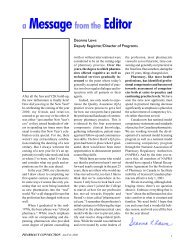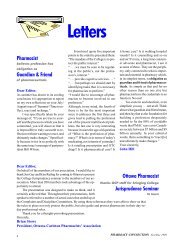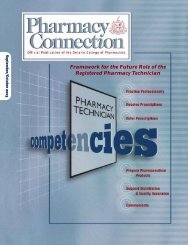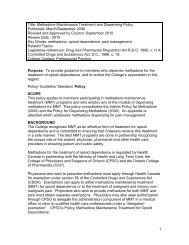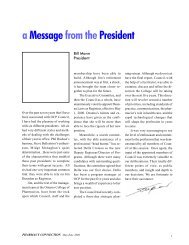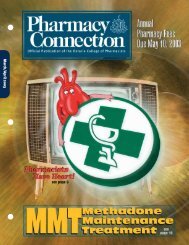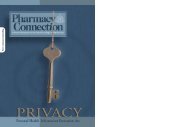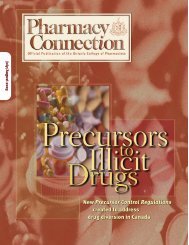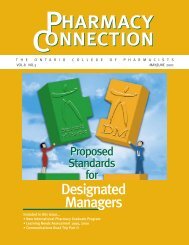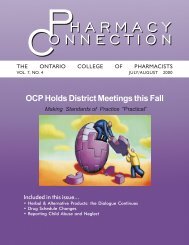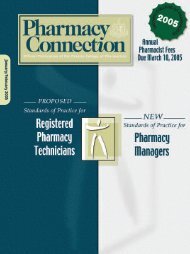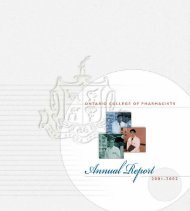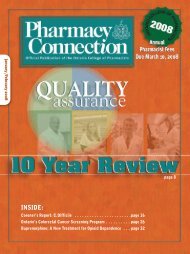Pdf File - Ontario College of Pharmacists
Pdf File - Ontario College of Pharmacists
Pdf File - Ontario College of Pharmacists
You also want an ePaper? Increase the reach of your titles
YUMPU automatically turns print PDFs into web optimized ePapers that Google loves.
For example, the addition <strong>of</strong> an angiotension converting<br />
enzyme (ACE) inhibitor for a patient with documented<br />
atherosclerotic cardiovascular disease may significantly<br />
reduce the risk <strong>of</strong> a future, serious cardiac event.<br />
5. When using psychoactive drugs in the ill elderly, the<br />
lowest dose possible should be the initial dose with<br />
further doses titrated upwards depending on the<br />
response unless there is convincing evidence that a<br />
higher dose is necessary because <strong>of</strong> compelling clinical<br />
considerations (i.e. acute delirium) which puts the<br />
patient at extreme risk and requires rapid intervention<br />
to eliminate the associated agitation which might interfere<br />
with medical care.<br />
6. Health care pr<strong>of</strong>essionals should be reminded that in<br />
the elderly, the use <strong>of</strong> combinations <strong>of</strong> medications<br />
may increase the risk <strong>of</strong> adverse reactions. When<br />
this type <strong>of</strong> therapy is indicated, monitoring for potential<br />
adverse reactions should be considered. This is<br />
especially the case with psychoactive drugs which<br />
include for example: alcohol, tranquilizers, sedatives,<br />
anxiolytics, antiemetics, neuroleptics, antidepressants<br />
and opiate containing analgesics.<br />
7. Health care pr<strong>of</strong>essionals caring for the elderly in the<br />
hospital setting should be reminded <strong>of</strong> the importance<br />
<strong>of</strong> ensuring that the patient and/or family and/or substitute<br />
decision maker are fully informed <strong>of</strong> changes to<br />
the medication pr<strong>of</strong>ile. When appropriate and available,<br />
the services <strong>of</strong> a consulting pharmacist can be<br />
a valuable resource.<br />
8. Health care pr<strong>of</strong>essionals should be reminded <strong>of</strong> the<br />
importance <strong>of</strong> reviewing the medication pr<strong>of</strong>ile <strong>of</strong><br />
elderly patients who develop a delirium. Frequently,<br />
these elderly patients are taking numerous psychoactive<br />
medications. The importance <strong>of</strong> agressivley<br />
pruning these psychoactive medications and medications<br />
that may potentiate the effects <strong>of</strong> the<br />
psychoactive medications cannot be overemphasized.<br />
9. Health care pr<strong>of</strong>essionals should be reminded <strong>of</strong> the<br />
importance <strong>of</strong> considering the benefits and risks <strong>of</strong><br />
prescribing psychotropic drugs to the elderly. Once<br />
prescribed, careful ongoing monitoring <strong>of</strong> the patient<br />
for the development <strong>of</strong> side effects should be mandatory.<br />
(Comment: this recommendation was made in two reviews in 2002)<br />
10. Health care pr<strong>of</strong>essionals should be reminded <strong>of</strong> the<br />
importance <strong>of</strong> including a critical review <strong>of</strong> the<br />
resident’s medications pr<strong>of</strong>ile as part <strong>of</strong> the<br />
comprehensive fall assessment.<br />
11. Health care pr<strong>of</strong>essionals should be reminded that<br />
Meperidine is a narcotic that should rarely, if ever, be<br />
prescribed for the elderly because <strong>of</strong> its prolonged half<br />
life, penchant for causing and/or exacerbating a<br />
delirium, and a tendency to mask other symptoms. If<br />
narcotic analgesia is required, consideration should be<br />
given to using a narcotic such as Morphine which has<br />
a shorter half life and less anticholinergic effects.<br />
12. Health care pr<strong>of</strong>essionals should be reminded that<br />
even the new atypical antipsychotic medications can<br />
cause extrapyramidial side effects such as<br />
decreased mobility, falls, hypertonic states, lethargy,<br />
and swallowing difficulties in the elderly. These side<br />
effects may develop shortly after the initiation <strong>of</strong><br />
therapy but more <strong>of</strong>ten will develop days to weeks later.<br />
13. Health care pr<strong>of</strong>essionals should be reminded <strong>of</strong> the<br />
need to exercise caution when prescribing antihistamines<br />
to the frail elderly given the potential for this<br />
class <strong>of</strong> medication to produce anticholinergic side<br />
effects and excessive sedation that could precipitate<br />
a fall.<br />
14. Health care pr<strong>of</strong>essionals should be reminded <strong>of</strong> the<br />
benefits <strong>of</strong> prescribing angiotension converting<br />
enzyme (ACE) inhibitors for elderly patients with<br />
documented atherosclerotic cardiovascular disease.<br />
15. Health care pr<strong>of</strong>essionals should be reminded <strong>of</strong> the<br />
proconstipatory effects <strong>of</strong> medications such as<br />
Verapamil.<br />
Pharmacy Connection March • April 2004 31



